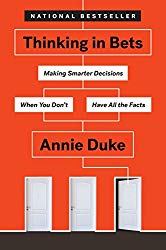Decisions are bets on the future, and they aren’t “right” or “wrong” based on whether they turn out well on any particular iteration. An unwanted result doesn’t make our decision wrong if we thought about the alternatives and probabilities in advance and allocated our resources accordingly. . . . It would be absurd for me, after making a big bet on the best possible starting hand (a pair of aces) and losing, to spend a lot of time thinking I was wrong to make the decision to play the hand in the first place. . . .
When we think probabilistically, we are less likely to use adverse results alone as proof that we made a decision error, because we recognize the possibility that the decision might have been good but luck and/or incomplete information (and a sample size of one) intervened.
Maybe we made the best decision from a set of unappealing choices, none of which were likely to turn out well.
Maybe we committed our resources on a long shot because the payout more than compensated for the risk, but the long shot didn’t come in this time.
Maybe we made the best choice based on the available information, but decisive information was hidden and we could not have known about it.
Maybe we chose a path with a very high likelihood of success and got unlucky.
Maybe there were other choices that might have been better and the one we made wasn’t wrong or right but somewhere in between. The second-best choice isn’t wrong. By definition, it’s more right (or less wrong) than the third-best or fourth-best choice. . . .
Being right feels really good. “I was right,” “I knew it,” “I told you so” — those are all things that we say, and they all feel very good to us. Should we be willing to give up the good feeling of “right” to get rid of the anguish of “wrong”? Yes. . . .
The world is structured to give us lots of opportunities to feel bad about being wrong if we measure ourselves by outcomes. Don’t fall for it!

